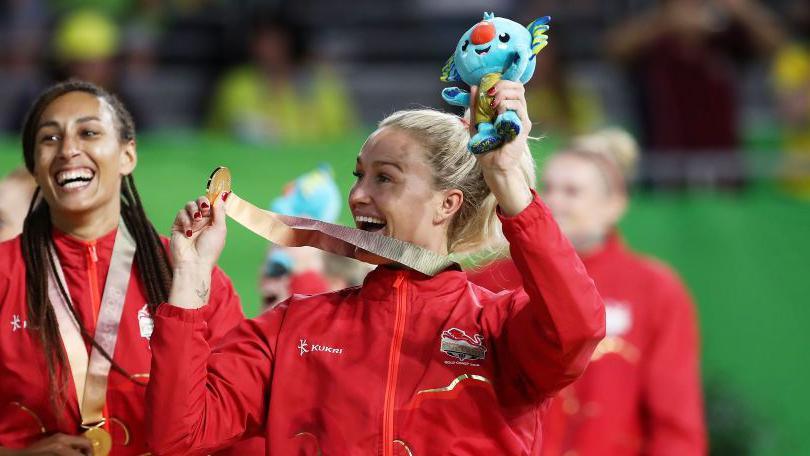To play this video you need to enable JavaScript in your browser.
“I want to be a mum more than anything, but it’s just not on the cards for me.”
Nottingham Forest netball head coach Chelsea Pitman is telling BBC Sport about her difficult fertility journey.
She is recalling the conversations and self-questioning that followed “quite a few” miscarriages.
“The future could be bright, who knows,” she adds.
That glimmer remains, but however Pitman’s future plays out, she is determined that pregnancy and motherhood are never taboo topics in sport.
The former England wing attack wants others to feel liberated to share their unspoken stories – whether those are first thoughts about having children, or the recounting of painful experiences such as her own.
Pitman claims netball clubs have backed away in the past from players keen to become mothers and says this must stop.
Looking back only a few years, Pitman points to negative attitudes towards players with maternal ambitions.
She was reluctant to discuss her own wishes, or even the fact she had become pregnant, for fear of jeopardising her playing career.
“I like to think it’s changed,” Pitman says. “Back then, absolutely not.
“You’d be judged by it, or if it came to contracts or recruitment, that’s going to be at the forefront of coaches’ minds in a high-performance environment: ‘What, they want to have a baby?’
“Those conversations need to stop now. Hopefully they have stopped, but 100% back then I know I didn’t want it to be common knowledge.”
At Forest, her attitude is welcoming to prospective parents.
Red Rose in a new Forest
Pitman, 37, is the Diamond who became a Rose.
Born in New South Wales, she won the 2011 World Cup with the Australia Diamonds before her father’s English background enabled her to switch allegiances.
In 2018, she helped the England Red Roses win Commonwealth Games gold on the Gold Coast, getting the better of Australia in the final.
Pitman has travelled extensively in her netball career but has settled in Nottingham, where she has “absolutely fallen in love with the city”.
She guided Forest, in their debut season, to a creditable fifth place in the eight-team Netball Super League, and to a remarkable double over derby rivals and defending champions Loughborough Lightning.
Pitman loves the “muck-in mentality” at Forest and works to fuel the culture.
There are children around the club. Scotland international Iona Christian gave birth to son Lawrie in March 2024 before joining Forest.
Pitman will often care for Lawrie while the squad are working hard in the gym.
She was experiencing “a flat day” recently before Christian handed her Lawrie.
“He just brought me back down to earth and took the stress off me,” Pitman says.
‘Lean on the ones you love’
Pitman thought having a baby would “be so easy”.
She feels her body, which allowed her to achieve so much in netball, “failed” her when she needed it most.
“I was like, ‘OK, my body allowed me to achieve everything there was to achieve in the sense of netball, but it hasn’t allowed me to achieve the one thing that I really wanted’,” she says.
One miscarriage came on England duty, shortly before Covid-19 triggered lockdowns.
Pitman was close to the three-month pregnancy stage at which point many people share their news with friends and family.
“It was really tough,” she recalls.
A cruel twist of fate meant Pitman, who knew she was miscarrying, was selected by UK Anti-Doping for a post-match urine test.
“For people that don’t know, you need to pee in a cup, and when you’re miscarrying, obviously things are happening as well. I just remember looking at the team doctor, going, ‘this is the worst week of my life’,” she says.
Pitman urges anyone going through pregnancy loss to “lean on the ones that you love” rather than delay conversations.
She elected to “just put it somewhere and then deal with it later”.
Eventually she told her story on social media and also spoke to BBC Sport about the toll of the lost pregnancies.
Pitman found she was not alone. A wave of support followed.
“I was like, ‘why do we keep this quiet?'” she says.
‘Life’s too short… do what makes you happy’
Pitman remembers speaking with friends about whether she would choose another gold medal ahead of starting a family. The answer came easily.
“Like 100%, I want to be a mum more than anything, but it’s just not on the cards for me,” Pitman says.
“We don’t know the future. The future could be bright, who knows, but that was probably the bit that I had to understand a little bit.”
Pitman gets “goose bumps” when she learns how other sports are helping women.
WTA Tour tennis players wishing to freeze eggs or embryos, so they can start a family at a later date, will have their ranking protected in future. The tour has also introduced paid maternity leave.
“I truly hope we head down that path,” Pitman says.
Realistically, netball lacks the necessary financial resources though. The Super League relaunched in 2025 but remains semi-professional.
“Until we are able to full-time pay those girls or those women, we can’t have those conversations about what maternity pay looks like and what support we can give in fertility options,” Pitman says.
For now, Pitman encourages players to back their instincts about whether to try for a baby.
Related topics
- Netball
Source: BBC

Leave a Reply